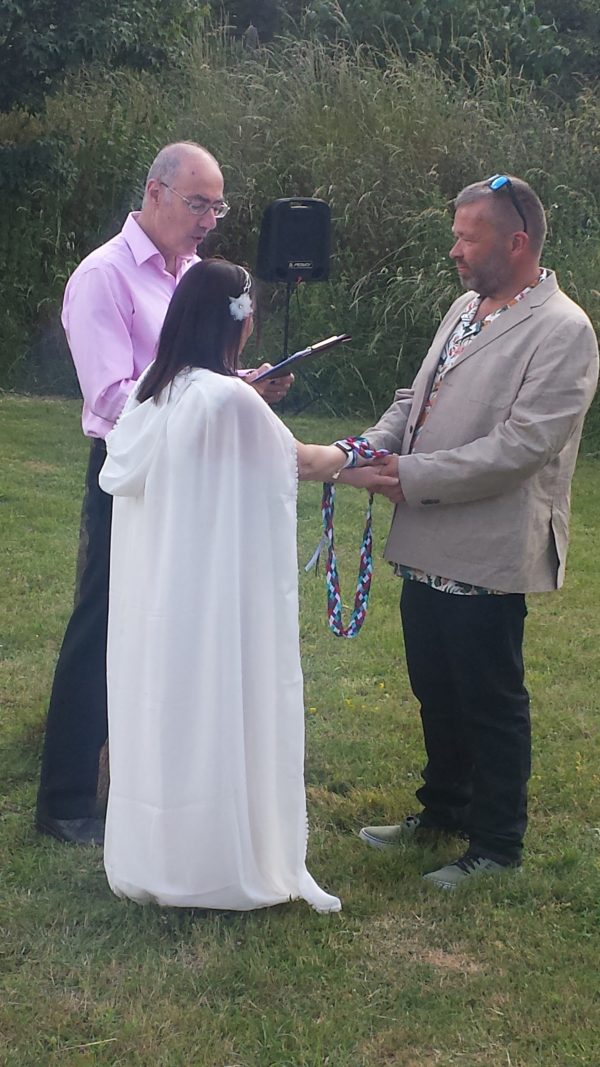
by Michael | Oct 18, 2022 | Blog
Unless you’ve actually been married already (and not necessarily even then!), you’ll make assumptions about weddings that aren’t necessarily true.
I’m going to take a few of these and set things straight.
Officiant
The registrar is not the only possible officiant. However, a marriage has got to be legally registered and, unless you marry under the auspices of certain religions (notably, C of E, Jewish or Quaker) which cover this, you’ll need to involve the Register Office.
You won’t necessarily need to go out to the Office. Registrars can come to your venue (depending on its compliance with certain stipulations) and conduct the ceremony there. The ceremony will be totally secular.
Apart from that, you have the option of a civil celebrant. (Currently – but this may change next July depending on the decision on the legislation reforms – civil celebrant ceremonies have no legal validity.) They are additional to Register Office services, offering the advantage of being fresh, even unique. They are certainly not standard and can reflect the couple’s beliefs and personalities.
Ceremony
With a civil celebrant, you have choice as to the type of ceremony you opt for. It can be quite wacky – but doesn’t have to be so. It can be relatively conventional. It can be part or wholly religious. So don’t go thinking that celebrant ceremonies have to be woo-woo!
But they can be, of course.
Cost
Everyone assumes that you need to take out a couple of mortgages to finance a wedding. Indeed, that may be the case, if you think too big. However, there are ways to reduce costs (eg making your ceremony off-peak, operating a cash bar, etc.).
But the point is that this should be a unique, unforgettable day, and that it really is worth pushing the boat out this once. You can’t put a price on memories.
Pressure on Couples
Your wedding may be subsidised or even paid for by others; that doesn’t mean that someone else should dictate what goes in, or stays out of, the agenda. It’s your big day, and that fact should be respected..
If pressure is being applied regarding the ceremony, remember that your officiant will be there for you and will support you.
So I hope these canards have been laid to rest. If I can help disperse any other misconceptions, don’t hesitate to ask.
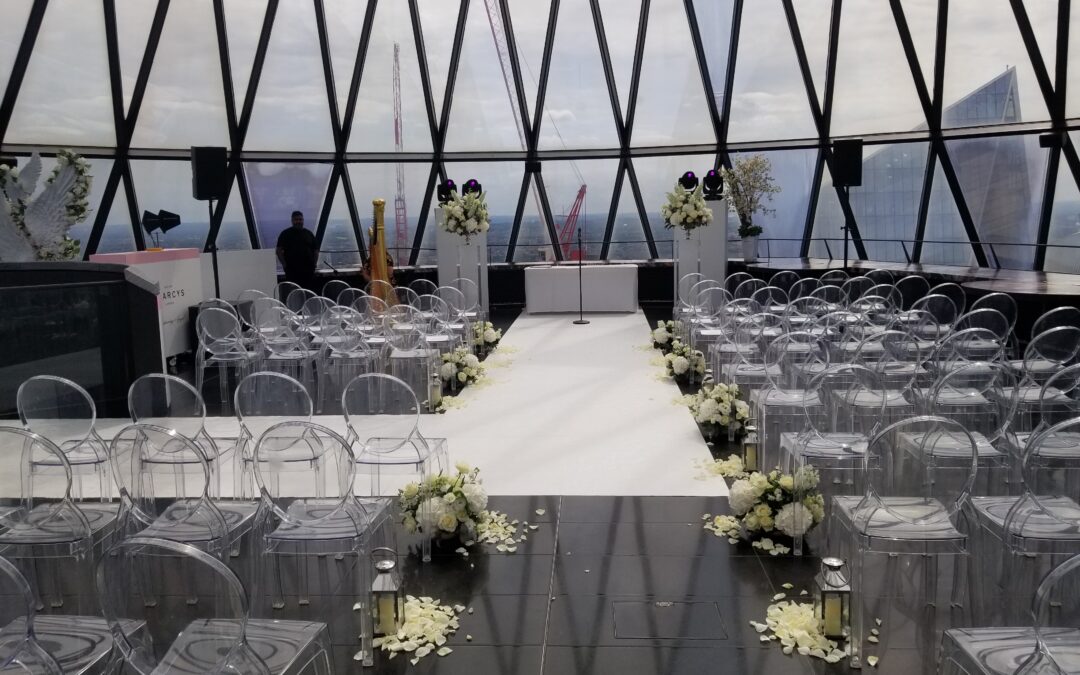
by Michael | Aug 23, 2022 | Blog
This may seem like an odd question! But you may need help deciding when to marry. By that I mean the most advantageous time, day and type of ceremony for you. (Not after downing half a dozen cocktails!)
The Ceremony
Proposals for new wedding legislation are going through parliament (slowly!) as I write. But we’re a few months away from any declaration and then the legal process won’t be that quick. So what follows is still up-to-date advice.
Register Office
Waters are slightly muddied these days, as Register Offices tend to be understaffed since COVID.
In principle, you can make an appointment, and go down there on the appointed day with two witnesses and have a 10-15 minute non-religious ceremony. That’s it.
Some registrars will come out to a licensed venue (at a significant cost) and conduct the wedding there, but this is not so easy to arrange nowadays, especially bearing in mind the staff shortages I referred to.
Alternative Ceremonies
Religious
Basically, nothing has changed regarding conventional church weddings, and that alternative is self-contained and standardised. You arrange this through your priest.
Part- or non-religious
For a unique, tailor-made service, you have a third alternative, which is where I could come in. A celebrant-led ceremony could contain as much – or as little – religion as you want, and also include rituals of your choosing. The whole service can be arranged according to your vision – even the venue. Your celebrant will be delighted to advise and guide you. Your ceremony can be as personalised as you wish.
When to Marry
As you might expect, peak periods (like July and August) tend to be more expensive. Weekends usually cost more, as do high season dates. Bank holidays and celebrations such as Valentine’s Day are likely to come out more expensive, and evenings can cost more than mornings/afternoons.
Whatever your choice, you will probably need to book well in advance, and give your guests plenty of notice. Especially if you’re opting for a destination wedding.
Discounts
It doesn’t normally hurt to ask suppliers if they’ll offer any reductions, especially if your event is out of season. They can only say no!
Conclusion
There’s plenty to think about, then, but I hope that these remarks shed some useful light, at least. You may need to be flexible and should certainly do some research, but the results can be so worthwhile.
Never forget that it is your big day, and you deserve to get it right.
Do speak to me. I’d love to help you further.
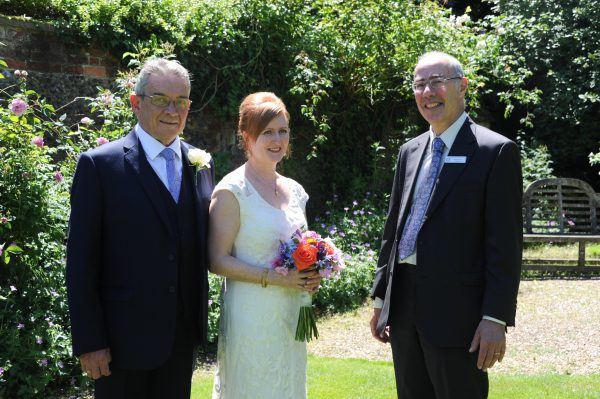
by Michael | Apr 11, 2022 | Blog
It’s understandable that I get asked what a civil celebrant actually is. I hope this blog will give you answers and paint a clearer picture, so you can see the potential benefits of working with one.
Here are a few questions I get all the time.
Are you a Humanist?
The short answer is “no”, but, in fact, I am much more than that. A Humanist is not supposed to include religious elements (or even the word “God”) in their service. However, if you want a secular service, you don’t need to resort to Humanists.
A civil celebrant can conduct a non-religious ceremony (as well as a part-religious or mixed-faith one). So that’s simple enough.
How much contact time is there between myself and officiant?
You will only meet the registrars for the first time at the marriage ceremony. The same may go for your vicar, if you’re having a church service. That’s not normally the case with a civil celebrant.
Apart from an introductory, discovery call (or visit) after your initial contact, you have access to your celebrant at all reasonable times from the time of booking until the day of the ceremony. So if you have queries or issues, it is easy to resolve them and you will feel more relaxed on the day because you will have established a close relationship with your celebrant.
How much control do I have over what goes into the service?
Only if you are working with a civil celebrant will you get free choice. Of course, you will also get guidance and advice, if wanted. Your ceremony will not be not standard or pre-ordained. You can have your own readings, vows or rituals – anything to make your ceremony personal and unique.
A church service is set in stone and the registrars offer a standard service, although sometimes they offer a modicum of choice.
So the content is basically unrestricted, if you work with a civil celebrant.
What about location and timing?
The church or Register Office ceremony is normally limited to “office hours”. A civil celebrant has no restrictions on when the ceremony can take place.
Likewise, with the location. A civil celebrant will conduct a ceremony for you almost literally anywhere. That’s clearly not the case with church weddings, and there are conditions to be complied with, in the case of Register Office services.
Hopefully, this will have clarified things a lot, but if you have further questions, please feel free to ask me!
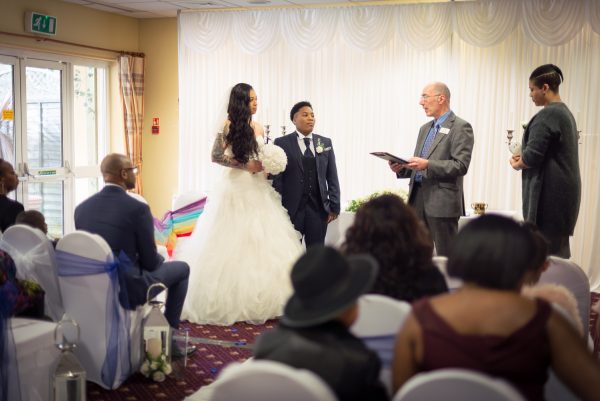
by Michael | Nov 29, 2021 | Blog
You’re getting married? Congratulations! Have you decided who will be the officiant? Will it be a priest (or equivalent), a registrar or a civil celebrant? Did you even realise that you have a choice?!
[This post is designed for English or Welsh couples, although laws are set to change in the not-too-distant future. Separate rules apply to Scotland and Ireland.]
Religion
If you are marrying in an Anglican church, this is as simple as it gets. You will be able to combine religious and legal in one ceremony. The same applies for Jewish and Quaker weddings.
Otherwise, you will have to arrange a trip to the register office and to the (non-C of E) church before you can be declared married.
Registrars
The registrars come at the other end of the spectrum to priests, although both services are pretty much standardised. The registrars are not permitted even to mention God or religion. What they do, however, is to pronounce the legal words. Without these being uttered and witnessed, no marriage is currently valid.
You need to make an appointment with the registrars and go to their office with two witnesses. Or the registrars may come to the venue of your choice (currently, there are restrictions, such as a minimum requirement of four solid walls, although this is changing). Be aware that this will cost you substantially more.
The registrars will offer you a minimum of choice as to the service structure. And their presentation skills can vary profoundly!
Celebrants
Until the law changes, possibly in late 2022, civil celebrants cannot marry people legally. They can bless them, conduct a part-religious (or even wholly-religious) service, hand-fast them, get them to sign a marriage certificate afterwards, but none of these make the marriage legal.
So what normally happens in these cases is that the couple marries first. The venue is the register office, unless the registrars come out (which is hardly happening under current restrictions). The ceremony takes place in a private room or in front of guests.
When the registrars have left, the civil celebrant can stand up and publicly conduct the personalised ceremony the couple have been dreaming of. It may be religious, or partly so; it may be (partly) humorous; it may contain ritual; active participation may be invited; favourite readings or music may be chosen; it is going to be unique to the couple.
At the end, the celebrant may declare the couple legally married (as long as the registrar service has been completed!).
The point is that, by using a celebrant, you have free choice as to the tone and content of your ceremony on your big day.
It’s all a bit confusing, I know! But if you want any further clarification on this issue, please feel free to contact me.
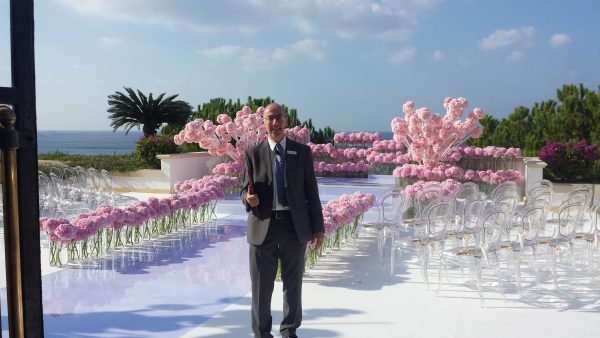
by Michael | Aug 16, 2021 | Blog
Do you fancy a traditional full religious wedding service? Many still do, although these are becoming less popular. You know what you’re getting with such a service – and that’s precisely what drives some people away. They prefer a unique, personalised ceremony to a standardised, predictable service.
The same criticism can be levelled at Register Office services. They tend to follow the same pattern. Moreover, some registrars have not been trained in public speaking and sometimes fail to deliver a memorable service.
An unexpected option
Not everyone’s aware of this choice, but a civil celebrant may be a better bet. They can offer a tailor-made order of service, which will make the ceremony very special and individual. Additionally, they will be very experienced in public speaking and can ensure that nobody is disappointed with the presentation. And what they offer does not have to be way-out or woo-woo!
Venue
Another advantage of a civil celebrant is that you can be married by them wherever you choose (subject to permission etc., of course!). So indoors or outdoors is not a problem. Conventional venues, like hotels, are available, as are quirkier ones, such as castles, marquees, beaches, warehouses, in woodlands, beside canals, etc.
Decor
You can individualise your wedding further by choosing original décor. Put your stamp on the invitations, seating plans and general signage.
Flowers
Flowers are another way to personalise the proceedings. One example is the display at a Cyprus wedding I conducted (see photo above). You may choose a floral arch, unique bridal bouquets and table furnishings.
Dress
The days of obligatory formal dress have gone for many people. The bride doesn’t have to wear white; the groom might not wear a suit. They can still show originality and style, however. For example, the groom might wear coloured socks or a special cravat, the bride may wear sandals.
Ceremony
I’ve already hinted at this, but a civil celebrant ceremony allows you individualisation. You can write your own vows. These can be moving and sometimes very funny! You can include ritual – a simple example would be the Loving Cup.
You could also include some religious elements, if you want.
You can invite family and friends to participate in the service, and, of course, the register (ie the degree of solemnity) is something you and the celebrant can agree on.
All of this, especially preparing the ceremony, is something I’d love tohelp you with.





